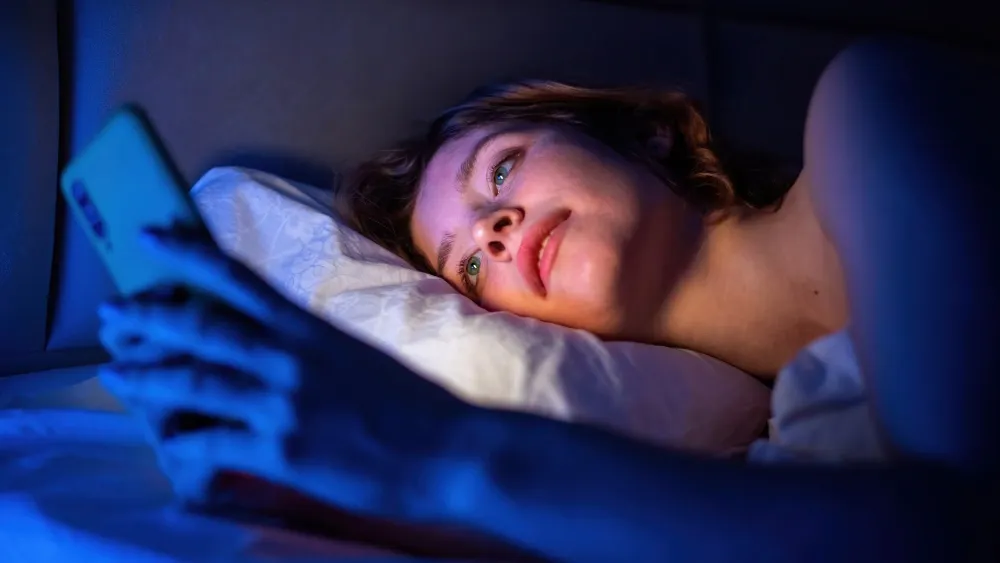
How Blue Light From Digital Devices Can Affect Your Sleep Cycle and 3 Ways to Improve Your Sleep?
Have you ever found yourself in bed, endlessly scrolling—just one more post, one more reel—only to realize it’s way past midnight? You tell yourself it’s harmless, just a way to unwind. But then, as you turn off the lights, you find yourself tossing and turning, your mind races and you can’t just settle your thoughts. Happens.
We live in a screen-connected world. The moment we feel alone, we reach for our devices. Screens keep us working, relaxing, and socializing, but they’ve also stolen something precious: our sleep. Blue light doesn’t just delay sleep—it disrupts it, draining your energy, focus, and well-being.
Those late-night scrolls are costing you more than the rest. They’re chipping away at your health, productivity, and even relationships. But it doesn’t have to be this way. With a few science-backed changes, you can reclaim your sleep—and transform how you feel, think, and live. Curious? Keep reading. The answers might just change everything.
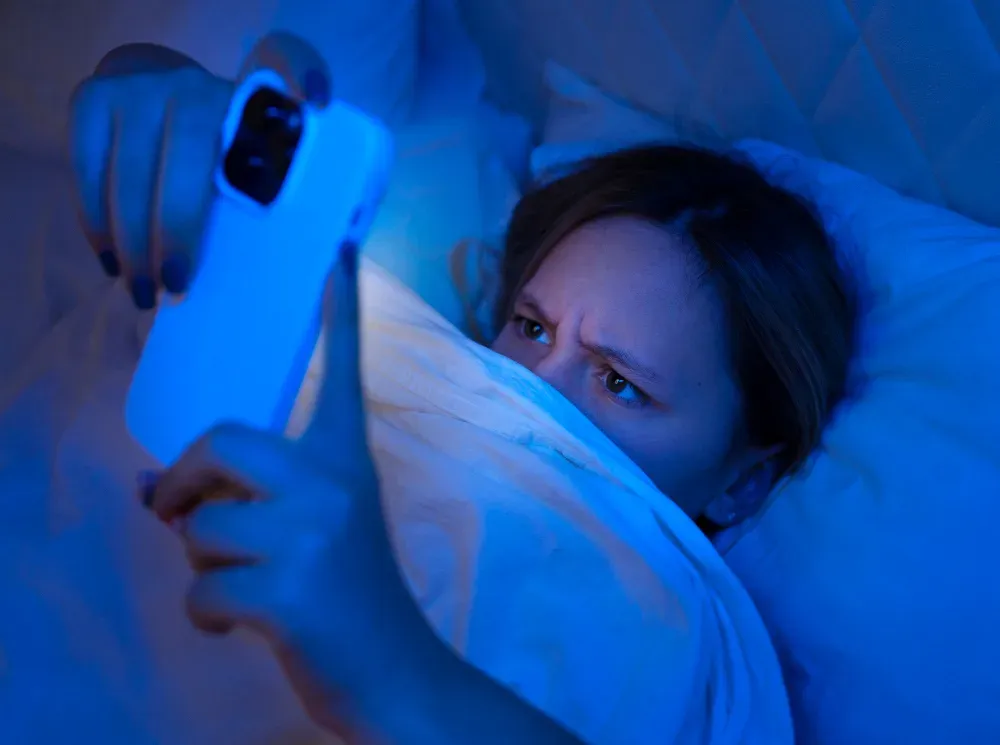
The Invisible Disruptor: What is Blue Light?
Blue light is a high-energy visible (HEV) light emitted by digital screens, such as phones, tablets, computers, and even LED lighting. Unlike other types of light, blue light has the unique ability to suppress melatonin, the hormone responsible for regulating sleep.
Normally, in the evening, melatonin levels typically increase, signalling to your brain that it’s time to relax and prepare for sleep. However, blue light mimics daylight, disrupting this natural process and keeping your brain alert.
The result? Your body’s natural sleep-wake cycle, also known as the circadian rhythm, is disrupted. Over time, this leads to difficulty falling asleep and poorer sleep quality overall. You wake up feeling sluggish, your energy depleted before the day even begins.
What is The Impact of Blue Light on Sleep?
You might wonder, “Does blue light really matter that much?” The answer is yes—more than you might think. Research shows that evening exposure to blue light disrupts sleep by interfering with melatonin. As night approaches, your body boosts melatonin production to help you wind down, but exposure to blue light can mimic daylight, confusing your brain and delaying the sleep process.
Dr Mariana Figueiro, PhD, director of the Lighting Research Center, found in The Journal of Clinical Endocrinology & Metabolism that just two hours of blue light exposure before bed suppresses melatonin production by over 50% longer than exposure to dim light. Blue light exposure from mobile phones before bed not only delays sleep but prevents you from achieving the deep rest, that is essential for your peak performance and well-being.
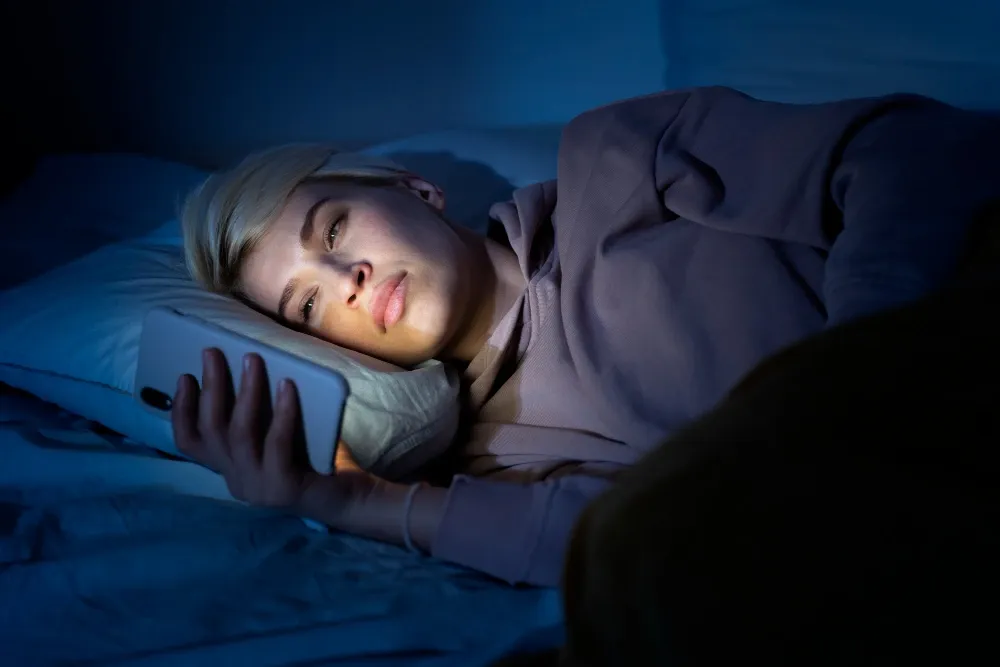
It’s not just adults who are affected. Dr. Nilong Vyas, in her study published with Sleep Foundation, claims, that children exposed to blue light at night often experience irritability and emotional withdrawal. Particularly in the age where sleep is easy, children struggle with falling asleep after screen use, leading to poor academic performance and less sleep duration.
And how often do you wake up feeling groggy after a night spent scrolling through your phone or catching up on emails? Think back to the mornings when you woke up naturally, feeling refreshed and ready to take on the day—those mornings when your mind was sharp, your body energized, and your patience with loved ones abundant.
Did you know that the toll of lost sleep isn’t just on your body? It seeps into your work focus, your health over time, and even the quality of your connections with those you care about. The good news is that with a few small, intentional changes, you can reclaim your energy and wake up to brighter days.
Real-Life Impact: People Who Took Those ‘Tough’ Steps?
Take Sarah, for example. A high school teenager, Sarah spent hours every night glued to her phone, chatting with friends and scrolling through Instagram until the early hours of the morning. The result? She was constantly tired, irritable, and struggling to focus in school. It wasn’t until her mother noticed the toll it was taking on her mood and performance that Sarah realized something had to change.
At first, she was hesitant her friends were still texting late into the night, and she feared feeling “left out.” But when she finally decided to turn off her phone an hour before bed, the difference was undeniable. Sarah fell asleep faster, woke up feeling rested, and found her mood steadily improving. Over time, her sleep quality transformed, and so did her school performance.
John, a software engineer, had a similar wake-up call. He thought his late-night work sessions and endless browsing were productive, but every morning, he woke up groggy and unfocused. After learning about blue light’s impact on sleep, he made one simple adjustment: cutting back on screen time an hour before bed. The results were striking he slept better, felt more energized, and noticed a significant boost in his productivity.
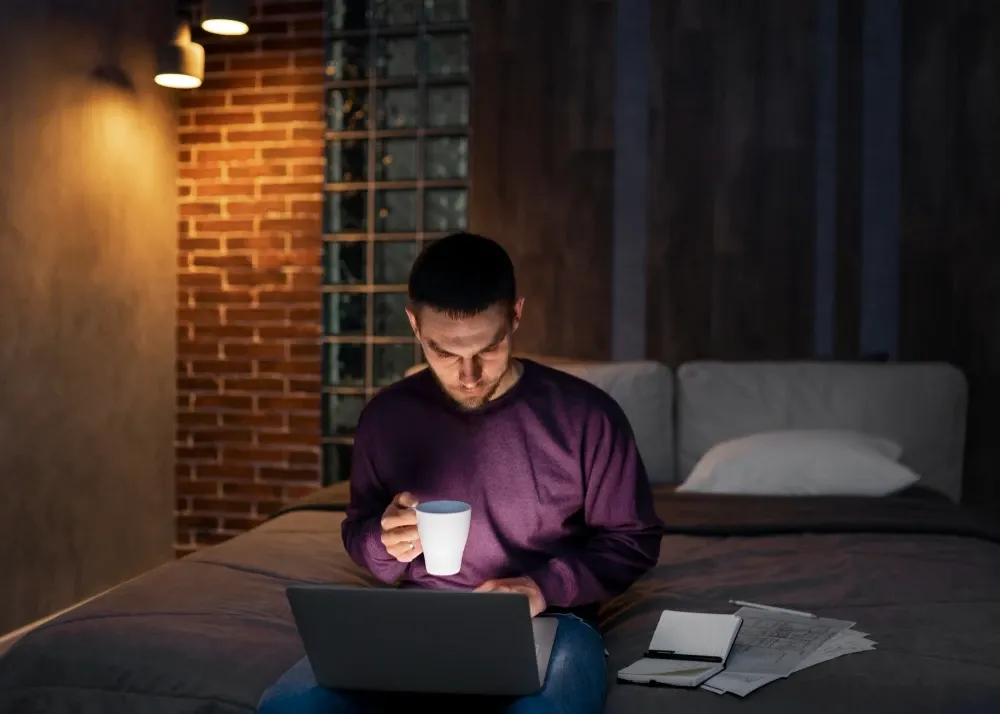
Science supports these transformations. A study published in Sleep Health revealed that reducing screen time before bed helps mitigate the effect of blue light, and leads to a marked improvement in sleep quality, especially among adolescents. Small changes, like those made by Sarah and John, show that reclaiming your sleep is entirely possible and the benefits go beyond just rest.
3 Ways to Improve Sleep & Reduce Blue Light
Improving your sleep doesn’t have to be overwhelming. Even small, intentional changes can have a big impact on your rest and overall well-being. Let’s start with three simple yet effective strategies:
1. Establish Screen-Free Zones and Times
It’s not easy to put down your phone after a long day—social media, your favorite show, or one last message feels like a way to relax. And that’s okay—it’s completely understandable. After all, your phone can feel like a comforting escape. But creating small boundaries can help you unwind in ways that truly restore your energy.
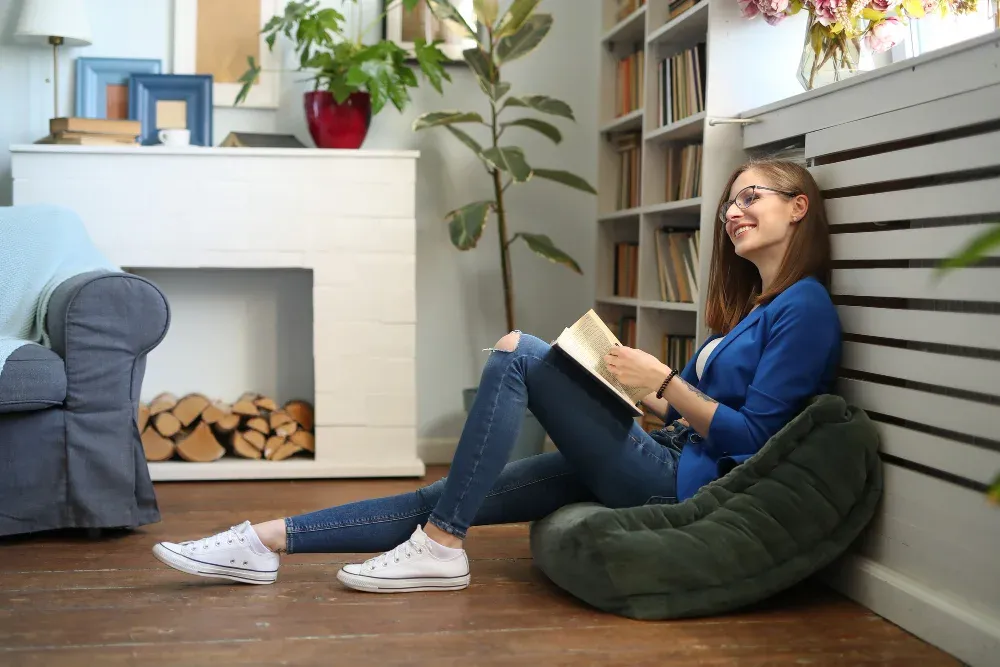
Start small. Make your bedroom a screen-free zone and use an alarm clock instead of your phone. Set aside 30 minutes to an hour before bed to unplug completely. Stretch your body, take a short walk without your phone, or simply enjoy some quiet time with loved ones. These small changes help your mind shift from the day’s chaos to a state of calm.
It does really work! Research from Harvard Health shows that technology in bed disrupts sleep quality. Stepping away from screens signals your brain to unwind, while mindful moments like a little body stretch, or a walk without your screen can prepare your body for restful sleep.
2. Adjust Lighting and Use Blue Light Filters
Sometimes, avoiding screens altogether isn’t possible, and that’s okay. But you can still reduce the impact of blue light by making a few adjustments. Many devices now come with "night mode" or "blue light filter" settings turn these on in the evening to soften your screen's glow. If you’re frequently on your devices at night, consider investing in blue light-blocking glasses. These can reduce digital eye strain and help you transition more smoothly to bedtime.
Beyond screens, think about the lighting in your home. Dim the lights as you get closer to bedtime. Warm, soft lighting can help your body prepare for rest, mimicking the natural setting of the sun.
Why it works because according to Harvard Health, blue light filters and dimmed lighting help reduce melatonin suppression, making it easier for your body to recognize that it’s time to sleep. So, try to fix this right now, and the results will be in front of you.
3. Build a Relaxing Pre-Bedtime Routine
It’s not just about what you stop doing—it’s about what you replace screen time with. A consistent, calming routine can help you transition to sleep more easily. Instead of scrolling on your phone, try reading a physical book, journaling, meditating, or taking a warm bath. Even a few minutes of quiet reflection can work wonders to calm your mind.
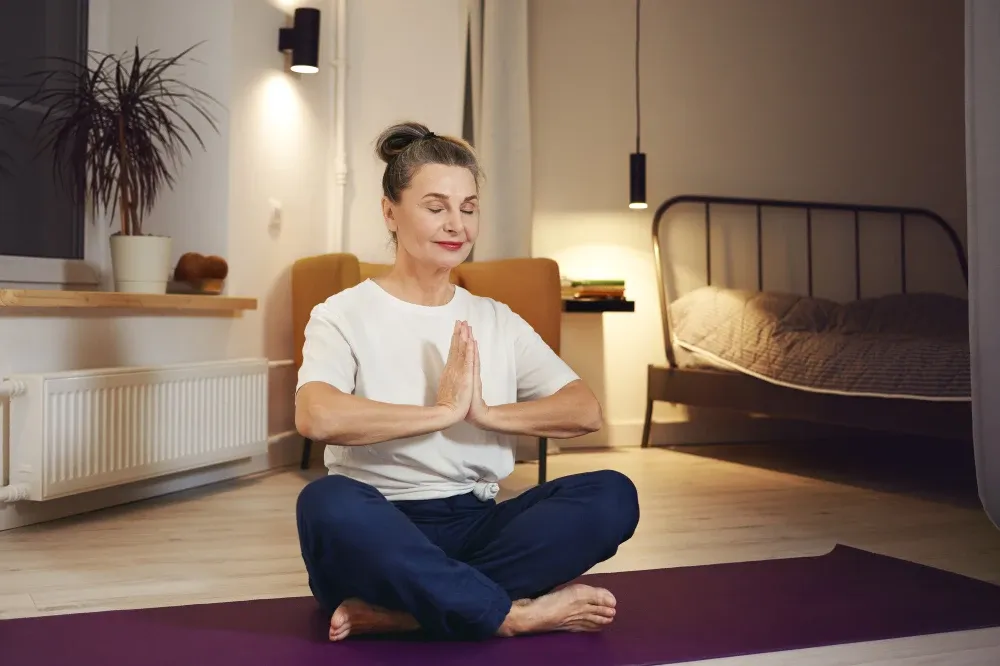
If staying away from your device feels challenging, apps like Jolt can help. With The Jolt App, you can set device limits, ensuring you’re not disturbed by notifications or tempted to scroll while enjoying your quiet time. This small adjustment can make a big difference, letting you truly immerse yourself in restful activities.
You don’t have to overhaul your entire evening routine—start small. Maybe tonight, you choose just one relaxing activity. Whether it’s reading or journaling, it’s about finding what works for you and giving your mind and body the chance to associate those moments with rest.
Start Your Journey to Better Sleep Today
You may feel like it’s impossible to unplug from your devices, especially in a world where everything is just a click away. But by making small changes, you can take back control of your sleep and your health.
Remember, it doesn’t need to be a complete overhaul. Start by reducing your screen time by just an hour before bed and replacing those moments with something more relaxing. Gradually, you’ll notice how much more refreshed you feel each morning, how much better your mood is, and how your productivity improves.
It’s your first step toward something beautiful that includes a night of better sleep, improved health, and a more balanced life. You deserve it. And trust us, it’s worth it.
So tonight, why not put your phone down an hour before bed and see what happens? You might just be surprised by how much it transforms your life.
Have You Seen This Yet?
How Too Much Screen Time Impacts Interpersonal Development
3 Scientifically Proven Ways to Build New Habits
3 Simple Ways to Fix Digital Eye Strain for Heavy Screen Users